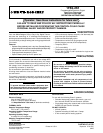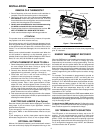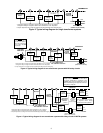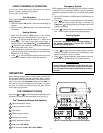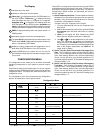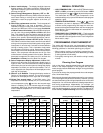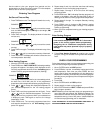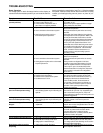
2
INSTALLATION
REMOVE OLD THERMOSTAT
1. Shut off electricity at the main fuse box until installation is
complete. Ensure that electrical power is disconnected.
2. Remove the front cover of the old thermostat. With wires
still attached, remove wall plate from the wall. If the old
thermostat has a wall mounting plate, remove the thermostat
and the wall mounting plate as an assembly.
3. Identify each wire attached to the old thermostat using
the labels enclosed with the new thermostat.
4. Disconnect the wires from old thermostat one at a time. DO
NOT LET WIRES FALL BACK INTO THE WALL.
5. Install new thermostat using the following procedures.
ATTENTION!
This product does not contain mercury. However, this product
may replace a unit which contains mercury.
Do not open mercury cells. If a cell becomes damaged, do not
touch any spilled mercury. Wearing nonabsorbent gloves, take
up the spilled mercury and place into a container which can be
sealed. If a cell becomes damaged, the unit should be dis-
carded.
Mercury must not be discarded in household trash. When the
unit this product is replacing is to be discarded, place in a
suitable container and return to White-Rodgers at 9797 Reavis
Road, St. Louis, MO, 63123-5398 for proper disposal.
ATTACH THERMOSTAT BASE TO WALL
1. Remove the packing material from the thermostat. Gently pull
the cover straight off the base. Forcing or prying on the
thermostat will cause damage to the unit.
2. Connect wires beneath terminal screws on base using
appropriate wiring schematic (see figs. 2 through 4).
3. Place base over hole in wall and mark mounting hole
locations on wall using base as a template.
4. Move base out of the way. Drill mounting holes.
5. Fasten base loosely to wall, as shown in fig. 1, using two
mounting screws. Place a level against bottom of base,
adjust until level, and then tighten screws. (Leveling is for
appearance only and will not affect thermostat operation.) If
you are using existing mounting holes, or if holes drilled are
too large and do not allow you to tighten base snugly, use
plastic screw anchors to secure subbase.
6. Push excess wire into wall and plug hole with a fire-resistant
material (such as fiberglass insulation) to prevent drafts from
affecting thermostat operation.
ELECTRIC/GAS JUMPER (Fan Option)
Read the following information before clipping the nonelectric
heat jumper. If you are unsure of your application, contact a
qualified service person.
If your emergency or auxiliary system will energize the blower,
then jumper, W904, on the thermostat base must be cut (see
fig. 1).
If your emergency or auxiliary heat system requires that the
thermostat energize the fan circuit, do not cut jumper W904.
OPTIONAL BATTERIES
With two "AA" batteries installed, your thermostat will maintain
time and continuously display the temperature during a loss
of AC power. Installed batteries will also allow programming
prior to installation.
ENERGY MANAGEMENT RECOVERY
(EMR)
When the EMR feature is activated the thermostat's microcom-
puter calculates the time it will take to change the room
temperature to the next heat or cool program setting. Then the
thermostat will start the system before the next programmed
period so that the desired temperature is reached at or near the
beginning of the period (the thermostat calculates 15 minutes
for every 1°F temperature change). This minimizes the use of
auxiliary stages during the transition period to reduce energy
costs.
For example: The thermostat is programmed to provide an
overnight heating temperature of 66°F, and during the next
program period, beginning at 6:00 AM, the programmed tem-
perature is 70°F. With EMR activated, the thermostat will auto-
matically start the heating system at 5:00 AM, so that the
programmed temperature of 70°F is reached by about 6:00 AM.
If the overnight room temperature drops only to 68F°, the
thermostat will start the system at 5:30 to reach the programmed
temperature of 70°F at 6:00.
The thermostat is shipped with the EMR feature active, which
means that the thermostat will start the heating system before
the beginning of the next program period. This feature provides
better efficiency by allowing gradual temperature changes using
only the first stage of heat.
To deactivate the EMR function, see the Configuration menu
on Page 5). The thermostat will then wait until the programmed
time to start the system for a temperature change.
O/B TERMINAL SWITCH SELECTION
The O/B switch on this thermostat is factory set to the “O”
position. This will accommodate the majority of heat pump
applications, which require the changeover relay to be ener-
gized in COOL. If the thermostat you are replacing or the heat
pump being installed with this thermostat requires a “B” termi-
nal, to energize the changeover relay in HEAT, the O/B switch
must be moved to the “B” position.
Optional (2) "AA" batteries
Mounting
hole
Mounting
hole
W904
Electric/Gas
jumper
O/B
switch
Reset switch
(below Fan switch)
Screw anchors
W
9
0
4
Figure 1. Thermostat Base



